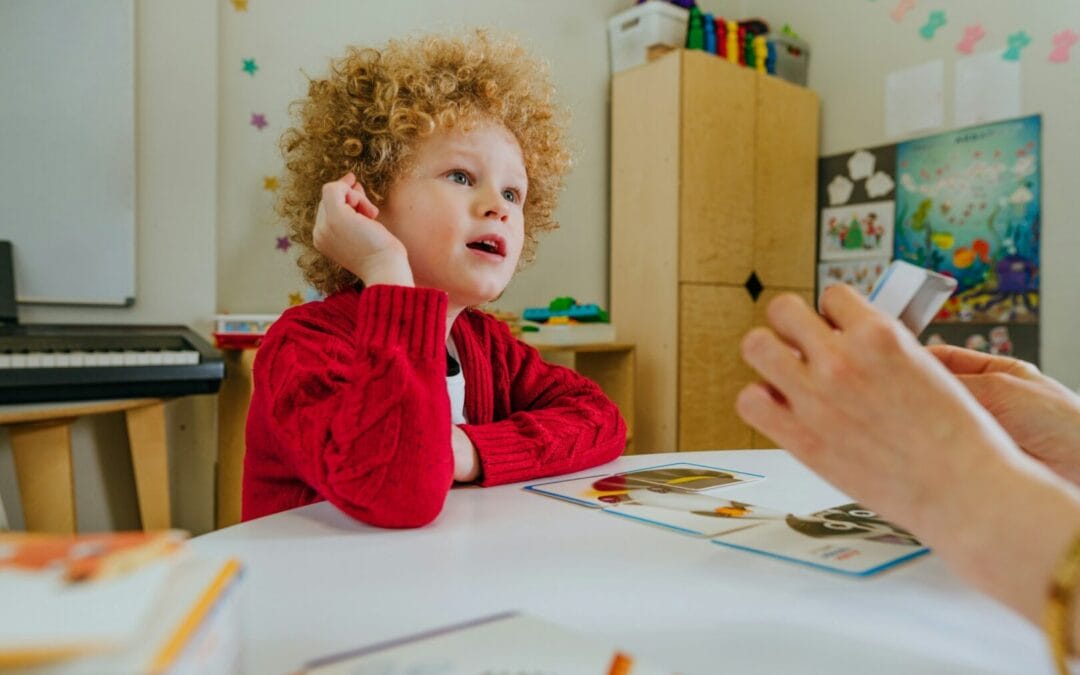School can be tough for kids who struggle with speaking and understanding language. That’s where speech therapy comes in to lend a helping hand. By improving communication skills, speech therapists make school life smoother for children who need a little extra support with talking and listening.
Speech therapists work with kids on things like pronunciation, understanding what others say, and even reading aloud. These skills are super important in classes where participating in discussions and following teachers’ instructions can be challenging. When kids get better at these tasks, they start feeling more confident and participate more in classroom activities.
Speech therapy isn’t just about talking. It also helps kids make friends more easily. Better communication skills mean kids can join in playground games, chat with classmates, and enjoy school activities. With the right support, kids can shine bright and really enjoy their time at school, turning challenges into stepping stones for success.
The Role of Speech Therapy in Academic Success
Speech therapy plays a key role in helping children succeed at school. It focuses on essential skills such as language development, pronunciation, and comprehension, which are vital for learning. Children who have trouble with speech often struggle in classroom settings, where these skills are needed for everything from understanding lessons to contributing in discussions.
Language development is a primary focus in speech therapy. Children learn to expand their vocabulary and use language effectively. This improvement helps them understand instructions and assignments better and allows them to express their thoughts clearly. As a result, they participate more actively in class and gain confidence in their abilities.
Pronunciation is another area where speech therapy makes a big difference. Clear speech is crucial for reading aloud, sharing ideas, and answering questions. When children pronounce words correctly, they can communicate their thoughts without frustration, ensuring that peers and teachers understand them easily.
Comprehension skills developed through speech therapy help children process information more efficiently. Being able to follow directions and understand explanations enables children to keep up with their classmates. These abilities support academic success and make learning less stressful and more rewarding.
Speech Therapy Techniques That Aid Learning
Speech therapists use a variety of techniques that directly support school-related tasks. These methods help children tackle challenges like reading aloud, following directions, and participating in class discussions.
– Modeling and Repetition: Children practice sounds and words through repeating phrases after the therapist. This helps them learn correct pronunciation and become familiar with sentence structures.
– Visual Aids: Pictures, flashcards, and storybooks are used to build vocabulary and comprehension. These tools make language learning engaging and help with word association.
– Reading Aloud: Therapists encourage children to read books or passages out loud, which improves fluency and boosts confidence in their reading abilities.
– Listening Games: Activities that require careful listening teach children how to follow instructions, an essential skill for successful learning and task completion.
– Role-Playing: Simulated scenarios, like a classroom discussion, help children practice conversation skills, learning to express their opinions and respond appropriately.
These techniques provide targeted support, enabling children to apply what they learn in therapy to their school environment. As their communication skills improve, kids find themselves more capable of tackling schoolwork, leading to enhanced academic performance and a more positive attitude toward learning.
Enhancing Social Skills for Better School Experience
Improving communication skills through speech therapy does more than just help with academics; it also helps kids feel more confident in social settings. When children are better at expressing themselves, they find it easier to connect with peers and teachers. This makes school a more enjoyable place for them.
Kids learn how to start and hold conversations, listen actively, and use body language effectively during speech therapy. They get to practice these new skills in a safe environment, which helps them feel more comfortable when interacting with others at school. Over time, kids who struggle with making friends or feel shy might begin to feel more at ease, opening up opportunities for new friendships and social connections.
Another important aspect is that speech therapy teaches children to recognize social cues and respond appropriately. Understanding these cues makes interactions smoother and more natural. For example, learning to wait for their turn to speak and responding to classmates’ questions can make group activities more fun and inclusive.
Being able to communicate clearly can significantly improve a child’s school experience. It helps them participate more in class discussions and school activities, making each day more rewarding. As children develop these skills, they gain confidence not only in speaking but also in other areas of their school life, creating a positive cycle of engagement and learning.
Integrating Speech and Occupational Therapy for Holistic Support
Combining speech and occupational therapy provides a comprehensive approach to tackling everyday school challenges for kids. Each therapy focuses on different, yet overlapping, skills. When therapists work together, they can better address a child’s needs across a wider range.
Speech therapy improves communication skills, while occupational therapy focuses on fine motor skills and daily activities. When combined, these therapies help kids in ways that enable them to handle both speaking tasks and physical tasks, like writing or using scissors, more effectively.
The benefits of integrating these therapies include:
– Enhanced Fine Motor Coordination and Communication: Kids learn to coordinate the movements needed for clear speech and other tasks like handwriting within the same sessions.
– Improved Focus and Attention: Both therapies can develop strategies to help kids stay concentrated during lessons, which aids in completing tasks independently.
– Consistent Skill Application: Working on different skills together allows kids to apply what they learn in speech therapy to physical activities, reinforcing their learning and making it more effective.
This integration creates a supportive setting where kids can thrive both academically and socially. As a result, children become equipped with tools that help them succeed in various areas of school life, making their educational experience more balanced and less stressful.
Conclusion: A Path to Success with Speech Therapy
Speech therapy is a powerful tool in helping kids succeed in school and in life. By enhancing communication skills, children can improve academically while also developing better social interactions. This dual benefit makes learning a more positive experience, fostering confidence and a willingness to engage with others.
Combining speech therapy with occupational therapy amplifies these effects, addressing a broader range of skills and challenges. This well-rounded approach supports children’s growth and helps them tackle school tasks with greater ease. It’s about setting them up for success, both inside the classroom and beyond.
At Watch Me Shine, we believe that every child deserves the chance to reach their full potential. Our integrated therapy sessions are designed to focus on your child’s unique strengths, providing a supportive environment to help them shine. Join our community today, and let early intervention speech therapy guide your child on their journey to becoming a confident communicator and successful learner.

